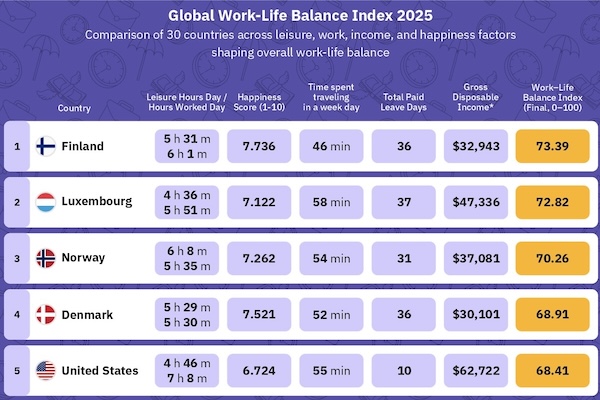 Credit: TradingPlatforms.co.uk
Credit: TradingPlatforms.co.uk
Broker-review and trading-platform comparison website TradingPlatforms.co.uk has reported that Luxembourg ranked second worldwide in its list of countries with the best work–life balance.
In a report published on Wednesday 12 November 2025, TradingPlatforms.co.uk stated that its analysis of 30 developed economies placed the Grand Duchy (2nd: 72.82/100) behind Finland (1st: 73.39/100) and ahead of Norway (3rd: 70.26/100) in its rankings.
To rank countries by their overall work–life balance, the team at TradingPlatforms.co.uk combined several key indicators rather than relying on a single measure such as working hours or income. Each country’s Work–Life Balance Index was constructed from seven measurable dimensions: leisure time, annual working hours, total paid leave days, commute time, happiness and gross disposable income per capita.
Countries with the best work–life balance:
- Finland – 73.39/100
- Luxembourg – 72.82/100
- Norway – 70.26/100
- Denmark – 68.91/100
- United States – 68.41/100
- Netherlands – 67.12/100
- Germany – 67.04/100
- Sweden – 67.01/100
- Austria – 66.25/100
- Australia – 63.15/100
The analysis placed Luxembourg in second position for paid leave and public holidays (26/11), behind Austria in first place (25/13) and ahead of the UK in third (28/8), and in second position in the category of high earnings and high life satisfaction ($47.3k/7.12), behind the United States ($62.7k/6.72) and ahead of Germany in third ($42.4k/6.75).
Martin Tunchev, Data Analyst at TradingPlatforms.co.uk, said: “Countries with a strong work–life balance consistently report higher levels of happiness, productivity and overall well-being. In Nordic nations such as Finland, Norway and Denmark, people work around six hours a day on average — when part-time and home-office work are taken into account — enjoy over five hours of leisure activities a day and benefit from generous paid leave, resulting in world-leading happiness scores above 7 out of 10. These societies demonstrate that shorter working hours and ample rest foster both personal satisfaction and sustained productivity.”
He added: “By contrast, countries such as South Korea, Mexico and Turkey, where people work over seven hours a day and face long commutes, rank lowest in terms of work–life balance and happiness. Even among wealthier nations, income alone does not guarantee well-being. In the United States, for example, despite high earnings, minimal paid leave and long working hours contribute to lower happiness scores compared with Europe. The evidence is clear: nations that prioritise rest, flexibility and time off not only create happier citizens but also stronger, more sustainable societies.”
The full report is available at: https://www.tradingplatforms.co.uk/research/work-life-balance-index/.









